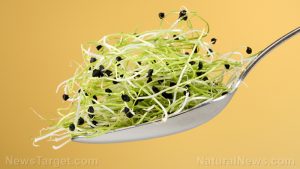
Advertisement
For hundreds of years, alfalfa has been used as feed for livestock. Now, this microgreen is famous among health enthusiasts because of its amazing qualities, which make it an incredible superfood.
Despite it’s small size, alfalfa is full of vitamins and other nutrients. Studies show that consuming alfalfa can help lower your blood cholesterol levels.
Alfalfa’s nutritional profile
Alfalfa (Medicago sativa), also called lucerne, is a plant prized as cattle feed because it is more nutritious than other feed sources. Alfalfa is a legume, but it’s also considered an herb. The plant is said to have originated in South and Central Asia, but it is now grown all over the globe.
Since alfalfa leaves or seeds are sold as herbal supplements and not foods, there is no standard nutritional information available for them. But studies suggest that alfalfa is rich in vitamin K and other nutrients, such as copper, folate, manganese and vitamin C.
Alfalfa sprouts have a similar nutrient profile to mature alfalfa and are also a low-calorie superfood.
A one-cup serving (33 grams) of alfalfa sprouts contains only eight calories and the following vitamins and nutrients:
- Vitamin K (13 percent of the Recommended Daily Intake (RDI))
- Vitamin C (5 percent of the RDI)
- Copper (3 percent of the RDI)
- Manganese (3 percent of the RDI)
- Folate (3 percent of the RDI)
- Iron (2 percent of the RDI)
- Magnesium (2 percent of the RDI)
- Riboflavin (2 percent of the RDI)
- Thiamin (2 percent of the RDI)
The same serving also contains one gram of protein and one gram of carbohydrates (mainly dietary fiber).
Alfalfa is also rich in bioactive plant compounds like:
- Alkaloids
- Coumarins
- Flavonoids
- Phytoestrogens
- Phytosterols
- Saponins

Here are three reasons to incorporate alfalfa into your regular diet:
Alfalfa can help lower your cholesterol levels
Several animal studies have shown that alfalfa can help lower blood cholesterol levels. Some small studies have also confirmed the same benefit in humans.
In one study involving 15 volunteers, researchers discovered that on average, consuming 40 grams of alfalfa seeds thrice a day can decrease total cholesterol by 17 percent and “bad” LDL (low-density lipoprotein) cholesterol by 18 percent.
In a separate small study involving three participants, researchers found that eating at least 160 grams of alfalfa seeds daily helped decrease total blood cholesterol levels.
Experts believe that this effect is because of alfalfa’s high levels of saponins. These plant compounds are known to help lower cholesterol levels. Saponins decrease the absorption of cholesterol in the gut and increase the excretion of compounds used to create new cholesterol.
Alfalfa can help boost metabolic health
Alfalfa is also used in traditional medicine as an anti-diabetic agent.
In one animal study, researchers found that alfalfa supplements helped decrease LDL, VLDL and total blood cholesterol in diabetic animals. Additionally, the supplements helped improve blood sugar control.
Alfalfa may help relieve menopause symptoms
Alfalfa is full of beneficial plant compounds called phytoestrogens, which are chemically similar to the hormone estrogen. This suggests that phytoestrogens may have similar effects in the body as estrogen.
Phytoestrogens offer some health benefits, such as relieving menopausal symptoms caused by decreased levels of estrogen.
According to one study, both sage and alfalfa extracts were able to completely resolve night sweats and hot flashes in 20 female volunteers.
Additionally, alfalfa’s estrogenic effects may be of help to breast cancer survivors. In one study, researchers found that those who ate alfalfa reported fewer sleep problems than those who didn’t.
Considerations before consuming alfalfa
While alfalfa is considered generally safe to consume, it’s best for the following individuals to avoid alfalfa due to possible side effects:
- People who are taking blood thinners — Since both alfalfa and alfalfa sprouts are full of vitamin K, high doses of the vitamin can make blood-thinning medications like warfarin less effective.
- Pregnant women — Alfalfa may cause uterine stimulation or contractions in pregnant women, so avoid it during pregnancy.
- People with autoimmune disorders — If you have been diagnosed with an autoimmune disorder, avoid eating alfalfa. According to some reported cases, alfalfa supplements have caused the reactivation of lupus in some people. Experts say the side effect is possibly caused by the immune-stimulating effects of the amino acid l-cavanine in alfalfa.
- People with weakened immune systems — It’s also best to avoid alfalfa if you have a compromised immune system since alfalfa sprouts sold in stores are sometimes contaminated with bacteria. Multiple bacterial outbreaks have been linked to alfalfa sprouts in the past. While consuming contaminated alfalfa sprouts can make anyone sick, the average healthy adult will recover without any long-term consequences. But if you have a compromised immune system, an infection due to contaminated sprouts can be very serious.
How to make alfalfa sprouts
You can buy alfalfa sprouts at health food stores or sprout them at home by following the steps below:
You will need:
- A bowl, jar or sprouter
- Alfalfa seeds
- Water
Steps:
- Add two tablespoons of alfalfa seeds to the bowl, jar or sprouter. Cover the sprouts with two to three times the amount of cool water.
- Let the sprouts soak overnight or for at least eight to 12 hours.
- In the morning, drain and rinse the sprouts thoroughly with cool water. Drain the sprouts again and remove as much water as possible.
- Store the sprouts away from direct sunlight and at room temperature for three days. Rinse and drain the sprouts thoroughly every eight to 12 hours.
- On day four, move the sprouts to a room with indirect sunlight to allow for photosynthesis. Continue to rinse and drain the sprouts every eight to 12 hours.
- The sprouts will be ready to eat by day five or six.
Follow the steps above to prevent bacterial contamination when sprouting alfalfa at home and always grow and store your sprouts in safe conditions.

Incorporating alfalfa into a balanced diet
You can buy alfalfa supplements in powder form, take it as a tablet or use it to make tea.
Since there are only a few human studies on alfalfa seeds, leaves or extracts, there is no standard dose for the superfood. According to the National Library of Medicine, alfalfa supplements have been used in doses ranging from five to 10 grams three times per day with no reported harm.
When taking alfalfa supplements, don’t exceed the recommended dose on the product label.
Here are some suggestions on how to add more alfalfa to your diet:
- Eat the sprouts raw in a salad.
- Stir in the sprouts with other veggies for a nutritious stir fry.
- Add alfalfa sprouts to your sandwich.
- Make an herbal tea. Use equal parts alfalfa, red raspberry leaf and peppermint. To brew the tea, pour eight ounces of boiling water over one tablespoon of the tea mixture. Let it steep for about five minutes before drinking.
- Add sprouts to hummus or bean dip.
- Add alfalfa sprouts to your green smoothies.
- Sprinkle sprouts on your oatmeal or granola for breakfast.
- Use sprouts as a garnish for chili, pizza or soups.
Boost your overall health and lower your cholesterol levels with nutritious alfalfa sprouts.
Sources:
Advertisements







